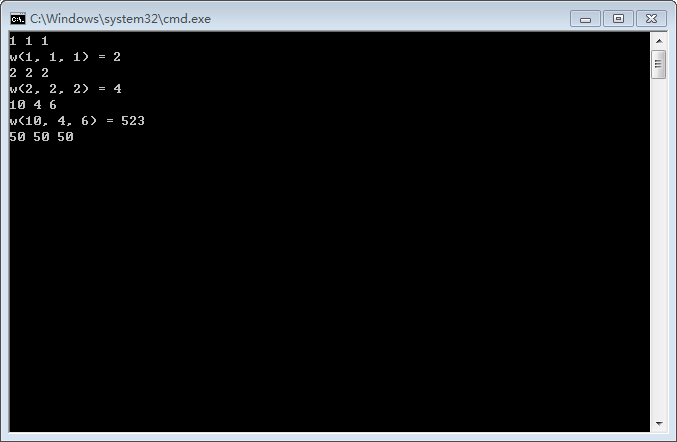Problem Description
We all love recursion! Don't we?
Consider a three-parameter recursive function w(a, b, c):
if a <= 0 or b <= 0 or c <= 0, then w(a, b, c) returns:
1
if a > 20 or b > 20 or c > 20, then w(a, b, c) returns:
w(20, 20, 20)
if a < b and b < c, then w(a, b, c) returns:
w(a, b, c-1) + w(a, b-1, c-1) - w(a, b-1, c)
otherwise it returns:
w(a-1, b, c) + w(a-1, b-1, c) + w(a-1, b, c-1) - w(a-1, b-1, c-1)
This is an easy function to implement. The problem is, if implemented directly, for moderate values of a, b and c (for example, a = 15, b = 15, c = 15), the program takes hours to run because of the massive recursion.
Consider a three-parameter recursive function w(a, b, c):
if a <= 0 or b <= 0 or c <= 0, then w(a, b, c) returns:
1
if a > 20 or b > 20 or c > 20, then w(a, b, c) returns:
w(20, 20, 20)
if a < b and b < c, then w(a, b, c) returns:
w(a, b, c-1) + w(a, b-1, c-1) - w(a, b-1, c)
otherwise it returns:
w(a-1, b, c) + w(a-1, b-1, c) + w(a-1, b, c-1) - w(a-1, b-1, c-1)
This is an easy function to implement. The problem is, if implemented directly, for moderate values of a, b and c (for example, a = 15, b = 15, c = 15), the program takes hours to run because of the massive recursion.
Input
The input for your program will be a series of integer triples, one per line, until the end-of-file flag of -1 -1 -1. Using the above technique, you are to calculate w(a, b, c) efficiently and print the result.
Output
Print the value for w(a,b,c) for each triple.
Sample Input
1 1 1
2 2 2
10 4 6
50 50 50
-1 7 18-1 -1 -1
Sample Output
w(1, 1, 1) = 2
w(2, 2, 2) = 4
w(10, 4, 6) = 523
w(50, 50, 50) = 1048576
w(-1, 7, 18) = 1
Source
Recommend
以下是我直接递归的错误代码。
#include<stdio.h> int w(int a,int b,int c) { if(a<=0||b<=0||c<=0)return 1; else if(a>20||b>20||c>20)return w(20,20,20); else if(a<b&&b<c)return w(a,b,c-1)+w(a,b-1,c-1)-w(a,b-1,c); else return w(a-1,b,c)+w(a-1,b-1,c)+w(a-1,b,c-1)-w(a-1,b-1,c-1); } int main() { int a,b,c; while(scanf("%d%d%d",&a,&b,&c)!=EOF) { if(a==-1&&b==-1&&c==-1)break; printf("w(%d, %d, %d) = %d\n",a,b,c,w(a,b,c)); } }

运行结果是这样的。
然后我发现在递归的过程中有很多重复的部分,导致超时,所以要用记忆化搜索来解决。
也就是把已经计算出来的结果放在一个数组里保存,下次计算到这里的时候直接读取结果就可以了。
下面是正确代码。
#include<stdio.h> int dp[20+5][20+5][20+5]={0}; int w(int a,int b,int c) { if(a<=0||b<=0||c<=0)return 1; if(dp[a][b][c]!=0)return dp[a][b][c];//直接读取 else if(a<b&&b<c) { dp[a][b][c]=w(a,b,c-1)+w(a,b-1,c-1)-w(a,b-1,c); return dp[a][b][c]; } else { dp[a][b][c]= w(a-1,b,c)+w(a-1,b-1,c)+w(a-1,b,c-1)-w(a-1,b-1,c-1); return dp[a][b][c]; } } int main() { int a,b,c,res; while(scanf("%d%d%d",&a,&b,&c)!=EOF) { if(a==-1&&b==-1&&c==-1)break; if(a<=0||b<=0||c<=0)res=1; else if(a>20||b>20||c>20)res=w(20,20,20); else res=w(a,b,c); printf("w(%d, %d, %d) = %d\n",a,b,c,res); } }

